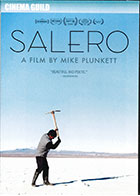
Salero 2015
Distributed by Cinema Guild, 115 West 30th Street, Suite 800, New York, NY 10001; 212-685-6242
Produced by Anna Rose Holmer, Andrew Goldman, Mike Plunkett
Directed by Mike Plunkett
DVD, color, 76 min.
College - General Adult
Documentaries, Family, Labor, Child Labor, Food, Business, Family, Family Relations, Ecology
Date Entered: 08/16/2017
Reviewed by Irina Stanishevskaya, University of Alabama at Birmingham LibrariesSalero’s director Mike Plunkett and his crew spent more than five years in one of the poorest countries in Latin America – Bolivia – exploring and filming a historical case of the past colliding with the future in the Salar de Uyuni, a unique natural landscape, containing the world’s largest salt flat, as well as a massive lithium reserve.
According to the country’s officials, the future of the Salar de Uyuni lies in the commercial potential of the production of lithium, which can fulfill the increased international demand for the metal. Lithium is used in electronics and electrical products, such as batteries for smartphones and other gadgets, computers, hybrid and electric cars, as well as in many metallurgical, pharmaceutical, and agrochemical products. The documentary contains a short clip from an inspiring speech by the Bolivian president Evo Morales, which he delivers in the Uyuni. In it, he insures that the production of lithium can benefit the economy of the entire country and improve the socio-economic conditions of current and future generations of Bolivians. Under his control, the government has planned to construct an industrial-scale lithium plant in the Salar de Uyuni, enhance the infrastructure, and generate jobs in the area. In the speech, the president Evo Morales states: “It is not only about lithium. It is about this country saying goodbye to the past.”
This industrialized future and rapid changes make the life of Moises Chambi Yucra, a salero – or salt gatherer – very uncertain. The authors offer detailed investigation and observation on how new developments in the area affect Moises’ work and the life of his family. Although Moises is very proud of his work and believes that the saleros are “the sons of this land,” he comes to understand that his labor-intensive traditional methods to harvest and produce salt make it more difficult to compete with advanced salt makers and to generate profit. As a result, he can no longer fulfill the basic needs of his wife and two children, nor to improve their leaving conditions. This dilemma requires Moises to find a realistic solution and to adjust his situation when the traditional way of work and life conflicts with technological and national progress. “Life may take me away from this place, but I accept whatever comes. Because if you are a salero, you are a part of the Earth” – concludes Moises. Salero is a contemplative documentary tale for individuals examining the effect of industrialization on socio-economics and cultural developments, as well as on the natural ecosystem in the Salar de Uyuni area. The documentary won Best Documentary Feature and Best Director awards at the RiverRun International Film Festival in 2017.